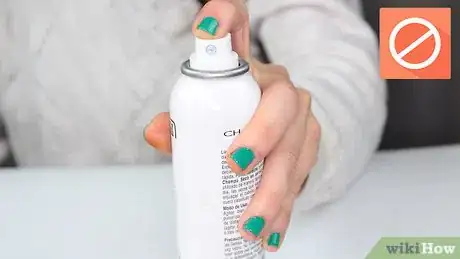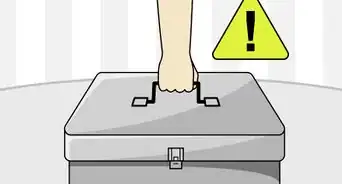This article was co-authored by Bridgett Price. Bridgett Price is a Cleaning Guru and Co-Owner of Maideasy, a maid service company that services the Phoenix, Arizona metropolitan area. She holds a Master of Management from the University of Phoenix, specializing in digital and traditional marketing.
This article has been viewed 51,060 times.
Ivory piano keys have a natural white luster to them and can be found on high end pianos. Over time, ivory piano keys can get dirty or turn yellow with use. To remove fingerprints, marks, and dirt, use a damp cloth and mild soap. If there is yellowing on the ivory piano keys, try applying rubbing alcohol, milk, or toothpaste. Another option is to use professional cleaning products to keep the ivory piano keys looking nice and clean.
Steps
Using a Damp Cloth and Soap
-
1Dampen a clean cloth. To remove surface layer dirt and marks, use a clean soft cloth. Slightly dampen the cloth with warm water. Squeeze out any excess water before you use the cloth so it is not too wet.
- Ivory piano keys should not be drenched in water as this can damage the ivory and cause the keys to swell, making them harder to play properly.
- Do not use a brush or scouring pad on the keys. A soft clean cloth will work just fine.
-
2Apply a small amount of mild soap. Once the cloth is damp, apply a few dots of mild soap. Use soap that has no fragrance or harsh chemicals, as these can damage the keys.
- Only use a very small amount of soap. You do not want the cloth to be drenched in soap or be lathered with soap.
- If you do not want to use soap, you can skip this step. Often marks and fingerprints will come off the ivory easily with just a damp cloth.
EXPERT TIPBridgett Price is a Cleaning Guru and Co-Owner of Maideasy, a maid service company that services the Phoenix, Arizona metropolitan area. She holds a Master of Management from the University of Phoenix, specializing in digital and traditional marketing.House Cleaning Professional
 Bridgett Price
Bridgett Price
House Cleaning ProfessionalRegular cleaning will keep the keys white. To keep your ivory keys white, dampen a microfiber cloth. Apply a little baking soda, toothpaste, or dish soap to the cloth, then lightly wipe down the keys.
Advertisement -
3Wipe the keys lightly. Wipe each key individually. This may take 20-30 minutes. Make sure you give each key a good wipe from top to bottom. Do not wipe them side to side, as this can end up damaging the keys. If you notice any stubborn marks, gentle wipe the area several times until the mark comes out.
- If there are stains on the keys, you may need to use a stronger cleaning solution like rubbing alcohol, milk, or toothpaste to remove them.
-
4Dry the keys. Once you have finished wiping each key, use a new clean cloth to dry the keys. Dry each key one at a time from top to bottom. Make sure there is no excess water sitting on the keys, as this can damage the ivory.
Applying Rubbing Alcohol, Toothpaste, or Milk
-
1Apply rubbing alcohol on the keys. Rubbing alcohol is a good option if you want to clean and disinfect the keys at the same time. Apply a small amount of rubbing alcohol on a clean soft cloth. Then, wipe down each key from top to bottom.[1]
- Once you have wiped all the keys, use another clean cloth to dry the keys. Make sure there is no excess rubbing alcohol or water on the keys, as this can damage them.
-
2Try non-colored toothpaste. Toothpaste can help to brighten ivory piano keys with stains or yellowing.[2] Take a damp cloth and apply non-colored toothpaste to it. Then, rub each key from top to bottom.[3]
- Check that the toothpaste does not contain any coloring or dyes before you use it. You do not want to end up dying the white keys or making them more stained with the toothpaste.
-
3Use milk to remove stains. If you notice the keys are turning yellow or have stains on them, you can try using milk to clean them. Ivory is a type of dental bone so the fatty acids and calcium in the milk will clean and protect the ivory. Apply a small amount of milk on a damp cloth. Then, wipe down each key from top to bottom.[4]
- Never scrub the keys hard with any cleaning products, including milk. This can end up damaging the keys.
Using Professional Products
-
1Try a bleach based cleaner. To remove stubborn stains or yellowing, use a bleach based cleaner on the ivory keys. Always dilute the cleaner with water so it is not too strong. Using too much bleach on the ivory piano keys can crack or damage them. Check that the cleaner is safe to use on ivory before you apply it.[5]
- Apply the diluted cleaner on the keys with a clean cloth. Do each key at a time from top to bottom. Then, dry each key well with a new clean cloth, making sure there is no excess cleaner on the keys.
EXPERT TIPFor an easy way to dust your piano keys, spray between them with a can of pressurized air.
Bridgett Price is a Cleaning Guru and Co-Owner of Maideasy, a maid service company that services the Phoenix, Arizona metropolitan area. She holds a Master of Management from the University of Phoenix, specializing in digital and traditional marketing.
Bridgett Price
House Cleaning Professional Bridgett Price
Bridgett Price
House Cleaning Professional -
2Use an ivory scraper. An ivory scraper is a product designed to remove yellowing and stains on ivory piano keys. You can find this tool online or at piano supply stores. Speak to a professional piano technician before you use this tool to avoid damaging the keys.[6]
- There is a risk that you will damage the ivory piano keys with the ivory scraper if you use it incorrectly. If you are not sure how to use the tool properly, reach out to a professional.
-
3Hire a piano technician to clean the keys. If the keys are really yellow or badly stained, you may want to consider hiring a piano technician for the cleaning. The technician will remove each key and clean them individually with an ivory scraper or a professional cleaner. They will know the best and safest way to remove stains and yellowing on the ivory.[7]
- Getting a thorough cleaning done on the keys once a year by a trained technician may be a good option, especially if you use the piano often.
Avoiding Damage to the Piano Keys
-
1Wash your hands well before playing the piano. To keep the piano keys clean, always wash your hands well before playing the piano. If others are playing the piano, get them to wash their hands before they touch the keys.
- You can also get in the habit of wiping the keys with a dry clean cloth after you done playing the piano. This can keep dust and dirt off the keys.
-
2Keep the piano out of direct sunlight. Place the piano a shady spot in your home in room temperature and low humidity. Putting the piano in a sunny spot can end up causing the keys to swell up and lead to yellowing of the keys over time.
- If the piano is not used often and you want to protect the keys from damage, you can get a long key cover to go over the keys or put down the key cover on the piano. Keep the keys covered until the piano is to be played.
-
3Avoid using aerosols or sprays around the piano. Air fresheners, furniture polish, and other aerosol products can damage the ivory keys and cause them to yellow over time. Keep these products away from the piano and do not spray the keys with these products.[8]
Community Q&A
-
QuestionWhy are the ends of some of the keys yellow?
 Community AnswerThey may turn yellow with age, after many hands have touched them, or if they just need to be cleaned.
Community AnswerThey may turn yellow with age, after many hands have touched them, or if they just need to be cleaned. -
QuestionHow can I tell if keys are plastic or ivory?
 Kai SchlegelmannCommunity AnswerThe weight of them and the age of the piano. Ivory will tend to be a lot more heavy than a plastic key, although there are good fakes. You can also look for grain on the key, because an ivory key will have grain patterns on it. The last thing is that Ivory in now illegal in most countries, so if you have a new piano it's unlikely that it will be ivory.
Kai SchlegelmannCommunity AnswerThe weight of them and the age of the piano. Ivory will tend to be a lot more heavy than a plastic key, although there are good fakes. You can also look for grain on the key, because an ivory key will have grain patterns on it. The last thing is that Ivory in now illegal in most countries, so if you have a new piano it's unlikely that it will be ivory.
Things You'll Need
Using a Damp Cloth and Soap
- A clean cloth
- Soap
- Water
Applying Rubbing Alcohol, Milk, or Toothpaste
- A clean cloth
- Rubbing alcohol
- Milk
- Non-colored toothpaste
Using Professional Products
- A bleach based cleaner
- A ivory scraper
References
- ↑ https://www.youtube.com/watch?v=Mx7X79ZBrSE
- ↑ Bridgett Price. House Cleaning Professional. Expert Interview. 23 May 2019.
- ↑ http://www.childrensmusicworkshop.com/resources/articles/pianokeys/
- ↑ https://www.thoughtco.com/how-to-whiten-piano-keys-2702041
- ↑ http://www.acrylikey.co.uk/bleaching_ivory.html
- ↑ https://www.thoughtco.com/how-to-whiten-piano-keys-2702041
- ↑ https://www.thoughtco.com/how-to-whiten-piano-keys-2702041
- ↑ http://www.childrensmusicworkshop.com/resources/articles/pianokeys/































































